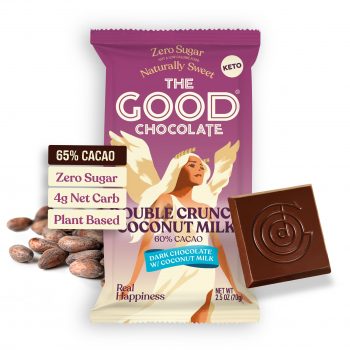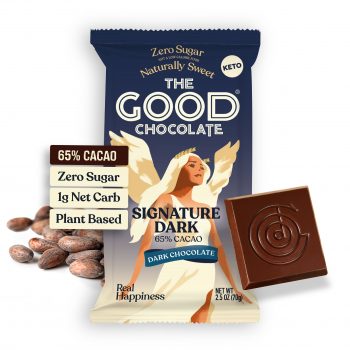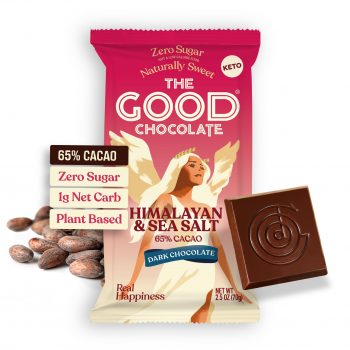
Other foods are just food. But chocolate is chocolate. (Patrick Skene Catling)
Once clear sign of Dark Chocolate’s popularity? The global market for dark chocolate is growing at 8% yearly, two percentage points faster than milk chocolate, which is increasing at 6%. There’s more to dark chocolate than just its taste – this popularity is increasing not only because it tastes good but because there is more cacao content in dark chocolate (and less sugar and milk), and higher percentages of cacao bestows greater potential health benefits. For example, antioxidants, fiber and vital minerals in dark chocolate can offer benefits ranging from good heart health to stabilizing our mood.
Chemically speaking, chocolate really is the world’s perfect food. (Michael Levine)
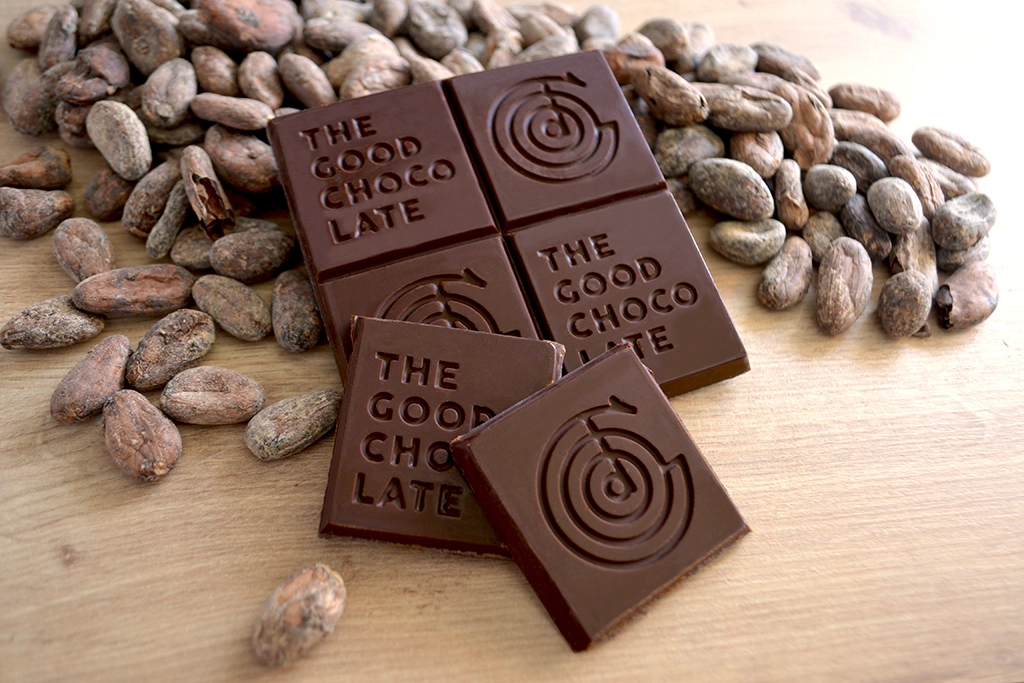
Dark chocolate has two sides to it – the rich, sweet side we all love so much and the healthy side that most of us don’t think as much about. Dark chocolate is a nutritional powerhouse that can help the body function at its highest level.
Let’s discuss its fiber content. A dark chocolate bar has at least 65 – 85% cacao content. You can get up to 25% of your recommended daily intake of fiber of 25 – 30g per day from a chocolate bar. Fiber may be essential to keeping the digestive system healthy, and may help prevent heart disease, diabetes, and even some kinds of cancer.
However, you can’t stop doing good right there. Again, dark chocolate also contains iron is a critical mineral to human health as it plays a role of distributing oxygen around the body. It prevents you from being too fatigued and keeps your immunity enhanced. Iron is also essential to have strong bones.
Dark chocolate also contains magnesium, which is vital for metabolism, heart rate, and bone mineralization.
Dark chocolate is also rich in antioxidants and polyphenols, flavonols, and catechins. These antioxidants are of great value because they give radicals of oxygen a chance to neutralize and protect the cells against damage, which can help prevent diseases.
So, the next time you savor a piece of dark chocolate, remember: indeed, you’re pleasing not only your cravings for sweet taste but also enjoying a source of many nutrients and minerals that may improve your health.
Coffee makes it possible to get out of bed. Chocolate makes it worthwhile. (Anonymous)

Studies indicate that dark chocolate can help lower blood pressure owing to its high content of flavonoids. One hypothesis suggests a mechanism for this, as flavonoids in dark chocolate stimulate the production of nitric oxide, which helps relax blood vessels and improve blood flow, thereby reducing blood pressure.
Need another reason to eat dark chocolate? The flavonoids in dark chocolate, accumulated in the brain areas, have been found to stimulate learning and remembering. These flavonoids may increase the flexibility of the brain and give longer lifetimes to brain cells. Such effects could help alleviate certain cognitive disorders like short-term memory loss. Want to do well on your next exam? Try eating chocolate while cramming the night before instead of loading up on coffee!
Dark chocolate turns out it may be healthful for the outside of your body as well! The flavonoids present in dark chocolate can shield your skin against the sun. These antioxidants have been found to trap UV light, help to protect the skin, and improve blood flow, while hydrating it, and improving its appearance. More studies need to be done, but if you’re craving a treat while sunbathing, you might be doing your skin more good by opening a chocolate bar instead of buying that ice cream cone.
Did you ever wonder why consuming dark chocolate can help you feel more happy? This is because dark chocolate has phenylethylamine (PEA), a chemical sometimes released by the brain when you feel loved.
The magnesium content of chocolate also stimulates serotonin production— a well-known neurotransmitter also dubbed the “feel good” hormone, because it helps stabilize mood, sleep pattern, appetite and other physiological activities. A small amount of dark chocolate can help some people have a good night’s sleep!
So listen up, the next time you eat dark chocolate, your heart and your brain might be thanking you. Now, isn’t that a good thing?
Life is like chocolate: you should enjoy it piece for piece and let it slowly melt on your tongue. (Nina Sandmann)
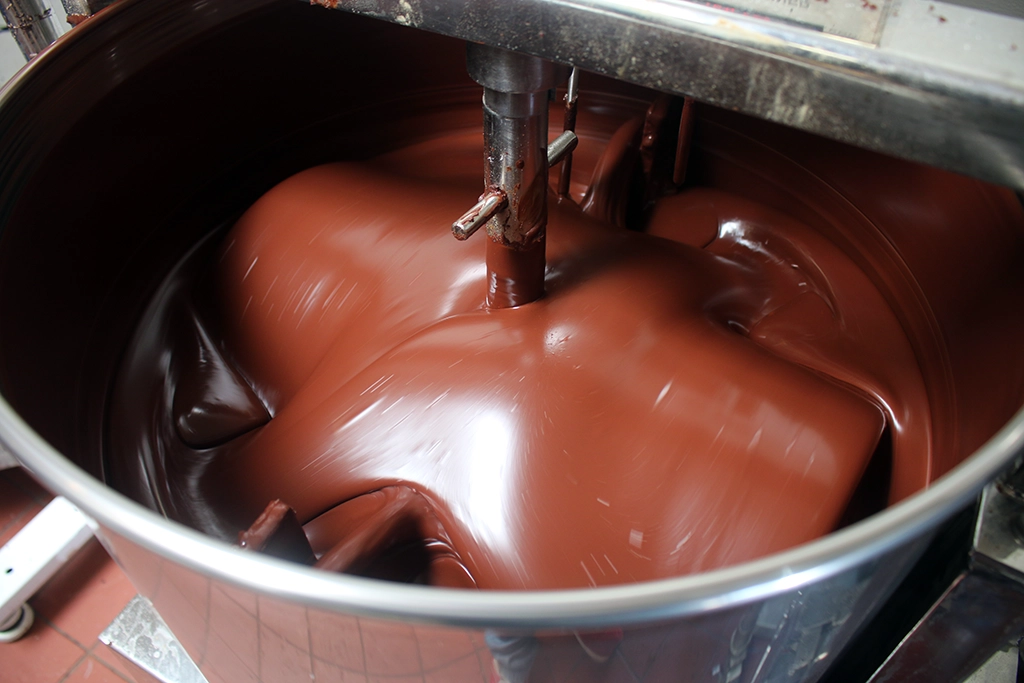
When it comes to dark chocolate, the rule of thumb is simple: the darker, the better. The main factor depends on the percentage of cocoa in it.
Dark chocolate is usually characterized by its 60-95% cocoa content, while that of milk and white chocolate less to none.
Chocolate comes in many different forms. They are not equal.
White chocolate is at the furthest end of the “healthier chocolate spectrum” because it contains no cocoa, just sugar, cocoa butter and milk. Milk chocolate is in the middle because it contains sugar and milk together with cocoa. The dark chocolate that chocolate lovers prefer is on the other end of the spectrum: no milk, less sugar, and more cacao. Dark chocolate usually has more complex flavor profile because high quality cacao has more diverse flavors, such as bitterness, sweetness, and even fruitiness.
Milk and White Chocolate are more tempting (and harder to stop eating 🙂 due to the higher sugar content and Dark Chocolate is the best if you are looking to boost your intake of cacao nutrients and benefits.
While dark chocolate benefits are intriguing, it’s essential to remember that moderation is key. Like any other food, dark chocolate can be part of a healthy diet, but it shouldn’t be the main course!
While dark chocolate is rich in nutrients and antioxidants, it’s still high in calories, mainly due to the fat content. Paradoxically, when it comes to chocolate that contains sugar, the higher the cacao content, the higher the calories. A 100-gram bar of dark chocolate with 70-85% cocoa contains around 600 calories. That’s about 30% of the daily caloric intake for the average woman and 24% for the average man.
So, while it’s okay to enjoy some dark chocolate each day, eating too much is not a good idea. As with everything, balance is vital.
It’s worth noting that dark chocolate made without sugar helps lower overall calories because sugar yields 4 calories per gram. So a 65% dark chocolate like The Good Chocolate made without sugar should have about 30-40% fewer calories.
As we wrap up our delicious journey through the world of dark chocolate, let’s take a moment to savor the key takeaways:
While there’s no “wrong” time to enjoy a piece of dark chocolate, some people find that having a small serving after lunch or dinner can be a satisfying way to finish a meal.
Dark chocolate does contain stimulants like caffeine and theobromine, which can boost your energy levels, so for this reason, avoid consuming it right before bedtime.
A common recommendation is to consume about 1 to 2 ounces (or 30 to 60 grams) a day. The US FDA guideline for portion size of chocolate is 30 grams.
Cacao is a low glycemic food, but sucrose has a high glycemic index of 65. When it comes to consuming chocolate, the higher the percentage of cacao, the lower glycemic response because it contains more cacao and less sugar. Dark chocolate is permissible for individuals with diabetes, particularly type 2, when consumed in moderation. Dark chocolate is also rich in fiber and antioxidants, which can have positive effects on insulin sensitivity and blood sugar control, and may benefit those with type 2 diabetes. Consulting with a healthcare professional can provide you personalized advice on your specific medical condition. Zero sugar dark chocolate made with Erythritol has one of the lowest glycemic responses in the chocolate aisle because there is no sugar and the sugar alternative has a zero (0) glycemic index, compared to sugar’s level of 60.
Dark chocolate may help you lose weight. It has ingredients like flavanols and polyphenols that may increase insulin sensitivity and decrease hunger, both of which help in weight loss. The fat in chocolate does help with feeling satiated, but the sugar can induce craving. Dark chocolate’s high fat and calorie content makes it vital to enjoy in moderation. It can be included in a balanced diet, but it shouldn’t be the only food used to lose weight.
Dark chocolate is generally considered safe for pregnant women. The flavonoids in it help in improved blood pressure and blood flow. However, consuming it excessively can pose risks due to caffeine. The American College of Obstetricians and Gynecologists recommends limiting caffeine to 200 milligrams per day during pregnancy (that’s about two (2) 6 oz. cups of coffee). . Dark chocolate has about 12 mg of caffeine in a 30g serving, so it’s possible to healthfully enjoy dark chocolate during pregnancy.
Yes, it’s okay to consume dark chocolate everyday. However, keep in mind the quantity you intake as overindulgence is bad for any food product.
Although chocolate in general is thought to be bad for teeth, chocolate with high cacao content may actually help prevent cavities and tooth decay. Research on theobromine, the active ingredient in chocolate, has shown the substance can remineralize damaged tooth enamel with the same efficacy as fluoride. Don’t start brushing your teeth with chocolate, because sugar is a known cause of cavities. Zero sugar chocolate may not harm teeth as much as chocolate-with-sugar, but either way, it’s essential to practice proper oral hygiene to prevent tooth decay. Chocolate using sugar alternatives like Erythritol can.
Yes, dark chocolate is ideal for those following a vegan diet, but it’s essential to check the ingredients list for any animal-derived products.
AUTHOR

SHARE FOR GOOD KARMA
MORE POSTS
Good things happen to those who read ; )
SPECIAL 15% OFF for BETTER BE GOOD blog launch!
Use code: betterbegood15 at checkout
